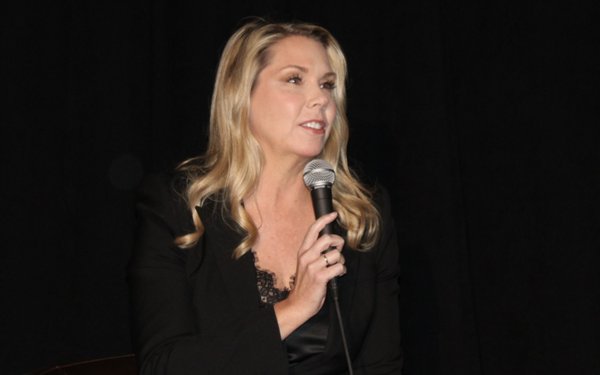
Nissan’s Allyson Witherspoon is
stepping aside from global marketing duties to give the U.S. her complete attention.
Witherspoon’s current title is chief marketing officer, Nissan U.S., where she is
responsible for marketing communications and media, data innovation and customer experience, enhancing brand value, customer trust and insights and brand and product marketing.
Previously she spent two years as corporate vice president, global chief marketing officer, based in Tokyo.
Witherspoon returned to the U.S. last fall and resumed the
U.S-focused duties after Marisstella Marinkovic exited the company in November after 11 months.
“There was a request for me to come back and lead both global as well as
the U.S. marketing,” Witherspoon tells Marketing Daily during a keynote interview at the Marketing Automotive conference at the New York Auto Show. “So I had a day job and a night
job. We've been going through a transformation and a restructuring and in order to speed up decision making, we've been working on decentralizing, so moving a lot of the responsibilities and
decision-making out of Japan and into the market. So now I'm solely responsible for the U.S., and I'm excited to be back.”
advertisement
advertisement
Like all automakers, Nissan has been affected by
automotive tariffs. As a result, the company decided to lower the prices on the Nissan Rogue and Pathfinder, its two best-selling models.
“So we're actually kind of taking a
little bit of a different approach. We're wanting to make sure that we have accessibility for consumers, knowing that there's a lot of uncertainty around this,” she says. I think there's a
lot of pressure on people's wallets.”
It’s a very dynamic environment in regards to tariffs, she noted.
“We have to be agile and from a
messaging standpoint, you will see we will be communicating about our lower pricing, as well as no new tariffs,” she says. “We also want to be communicating that we've actually been
manufacturing in the U.S. since 1983. We have three production facilities, two in Tennessee and one in Mississippi. And so we want to make sure that consumers know that because I think consumers are
very confused.”
Consumers are searching for where models are built, she says.
“They're searching at 2000% increase rates over the last few
weeks,” she says. “And what we wanted to do was first match [with] where consumers looking for this type of information [were] in the first place, search. So that's immediately where we
started to make our revisions and modify our marketing plan, making sure all of our digital advertising is all consistent with that, and then TV.”
Leading with digital was the
reverse of what is typically done, she notes.
“I think overall we're looking at modifying our production plans and making sure that we're bringing production in the
U.S.,” she says. “We already have a lot of production here. And then it's going to be, how do we adjust our marketing plans and which models do we invest behind? And some of them may not
be getting as much investment as we originally planned, because they're ones that we can't move to U.S. production yet. So we want to make sure that we're focusing on the ones where we can provide
consumers with the most accessible pricing.”
The pandemic taught automakers a lot about being agile during a supply chain shortage.
“I think I'm still
recovering from that, actually,” she says. “But I think all of those things in a way got us ready for where we are now, and we were able to work very quickly.”
Nissan was recently in the news for withdrawing funding from some local Pride events, but the decision was not politically motivated, she says.
“As we were
looking forward into 2025, we really wanted to evolve our go go-to market approach and make sure that we were having maximum use of all of our dollars,” Witherspoon says. “And that's
focusing it around measurable media, and making sure that we can really drive traffic. So it wasn't targeted around Pride festivals at all. It was actually looking across the board at all of the
sponsorships and all the partnerships that we have, and making sure we were focusing on the ones that are strongest, highest ROI-driving activities.”
Besides Pride festivals,
the company also pulled away from auto shows and NCAA activations.
“We had to make difficult decisions about some things that we had been doing for a lot of years. But
it was really about, how can we reallocate those investment dollars to something that actually could be much broader?" she says. “So as we looked across the board, it was really a very
data-driven national."
Several recent creative executions have featured the full line of vehicles without brand ambassadors such as actress Brie Larson, but the relationship with
her continues.
“You will see her in the later part of the year,” Witherspoon says. “You'll see a lot of our brand ambassadors are in social media, which we find is
a really effective way of using creators and different ambassadors."
The automaker also continues to have a relationship with Matt James, the first Black male lead for "The
Bachelor" in season 25, as well as actors Jonathan Bennett and Emelia Hartford.
“So these are all ambassadors and creators that we've been working with -- and again, focusing
where their audiences really are, where we can get the most kind of relevance and discovery from people,” Witherspoon says.